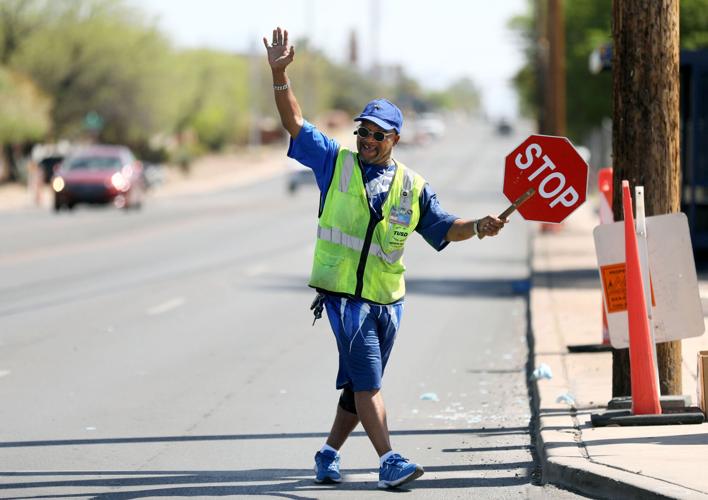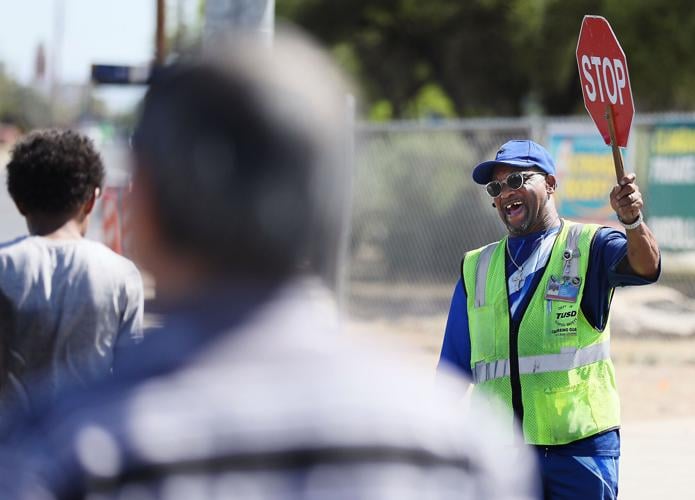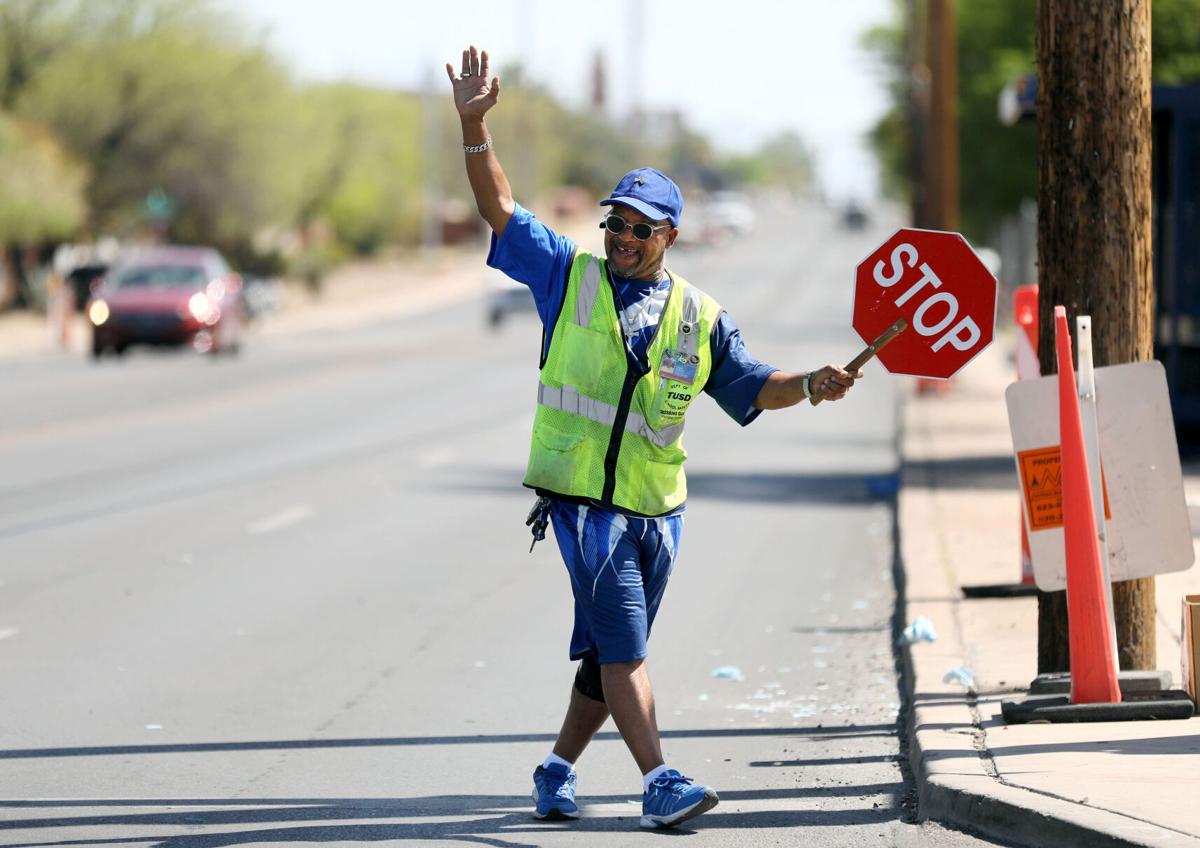It’s Wednesday morning outside Blenman Elementary School, and crossing guard Vernon Williams is working up a sweat from all the joy he’s spreading.
The Tucson Unified School District employee dances and waves and blows kisses to passing cars and people from his corner on Country Club Road, where Elm becomes Pima Street.
When he catches someone’s eye, he offers up a virtual hug by folding his arms across his chest and squeezing his own shoulders. When he sees a fellow veteran, he stands at attention and snaps off a crisp salute.
Anyone on a bicycle or driving with their windows down can expect a cheerful shout.
“Wednesday hug!” he yells to a woman who lowers her window as soon as she sees him. “Two more days to go! You got this!”
“I’ll see you tomorrow,” the woman replies.
A red light on Elm stops a work truck towing a flatbed trailer.
“Go get your money!” Vernon says to the driver. “You’re making so much, you had to get yourself a trailer!”
A guy in an orange T-shirt pokes his arm out the truck window and gives an enthusiastic thumbs up.
Across the intersection, fellow Blenman crossing guard Sevrina Leeth waves and dishes out some “Good mornings!” of her own.
Not everyone responds. Many do.
Every few minutes, drivers give a few short blasts of their horns as they roll through the intersection. “The happy honkers,” Leeth calls them.
One driver offers Vernon a distracted half-wave without taking her hand off the steering wheel, so he doubles down, planting a kiss on his hand and throwing it at her like a Frisbee.
She’s still laughing when the light changes and she drives away.
“You be safe now!” Vernon tells her. “Be safe!”
And then there are the kids.
“Good morning, sunshine!” he yells to one little girl as she arrives at the corner with her mother, ready to cross. “I’ve been waiting on you all!”
The girl smiles shyly and shuffles off to school.
Vernon says he and Leeth are on a mission: “Our goal is to make this the friendliest corner in Tucson.”
You can tell he means it, too, because of what he says next.
“I have to find fun in everything, because the life I was living was a joke,” the 60-year-old explains. “This is fun. I get paid to play in the street.”
School crossing guards, Vernon Williams and Sevrina Leeth, want to make E. Pima Street and N. Country Club Road the "friendliest corner" in Tucson. Williams, a veteran, says he suffered from post traumatic stress disorder, PTSD, and waving to drivers and giving air hugs helps with his recovery. Williams and Leeth work outside of Blenman Elementary School. Video by: Mamta Popat, Arizona Daily Star
Yellow light
Vernon heard about the job with TUSD from a friend from church who works as a crossing guard.
When he handed in his application, he says, he also provided some letters of recommendation, a few counseling certificates he had earned and a full background check on himself so they would know who he used to be and who he is now.
Much to his surprise, he was offered the spot at Blenman in March 2020.
“They gave me a second chance when I didn’t think I deserved it,” he says. “And guess what happened? Right after I got hired, bam, here comes the pandemic.”
He would spend his first year of work doing perimeter checks at an empty school or handing out take-home box lunches to families in the parking lot. He didn’t get to strut his stuff on the corner until in-person classes resumed in March 2021.
The waving was Leeth’s idea.
She has been a parent volunteer at Blenman for more than a decade, starting when her oldest daughter, now 18, was a kindergartner there. She eventually joined the paid staff as a crossing guard and hall monitor.
About two years ago, she found herself working the busy, narrow intersection by herself after her former crossing guard partner retired. That’s when Leeth started waving to passing motorists and anyone else she could see, just to keep herself going.
These days, the only time her right hand stops moving back and forth is when she’s holding up her stop sign and escorting kids across the street. “When the weekend comes, I’m like, ‘Ah, I can’t move this arm,’” she says with a laugh.
Since Vernon joined her on the corner last year, he has taken things to a whole new level.
“The dancing and jumping around — that’s too much coffee for me,” Leeth says.
It also seems a little distracting at times, but that’s kind of the point. People tend to slow down when they see Vernon or hear him shout. “If someone is looking at me, they aren’t looking down at their phone,” he says.
Blenman parent Veronica Johns gets a big kick out of her friendly neighborhood crossing guards, and so do her sons, Martin, 6, and William, 11.
“It’s really fun,” Johns said, after walking her boys to the corner so Leeth could lead them safely across Country Club. “Everybody just seems so excited to see them.”

Vernon Williams is all smiles during his crossing guard duties at Blenman Elementary School at East Pima Street and North Country Club Road in Tucson.
Red light
It was Vernon’s therapists at the Veterans Affairs hospital who taught him the value of letting the sunshine in.
“They said, ‘Open the blinds and welcome the morning,’ and I started doing it,” he says. “I started with, ‘Good morning, morning,’ and ‘Good morning, sun.’ Then my Christian belief got me to say, ‘Good morning, Lord.’”
The crossing guard thing lets him try it out on people. “Waving to everybody every morning is a great part of my recovery,” he says.
Vernon was born at Fort Hood, Texas, in 1962, the oldest of four kids in a military family that bounced around the country.
After stops in Georgia, Oklahoma, California, New Jersey and Missouri, he graduated from high school at Fort Riley, Kansas, but didn’t have the grades to go to college. His dad, a three-tour veteran of the Vietnam War, suggested he give the Army a try, so Vernon enlisted in 1980.
A year later, while he was posted in Panama, the communications truck he was riding in blew a tire and rolled down a 25-foot cliff, slingshotting him through the windshield.
“I had 375 sutures in my face,” he says. “They put me in a coma to reduce the swelling in my brain.”
After 45 days in the hospital, he was sent back to his unit to handle top secret code books and sensitive communications gear in an underground vault, but the accident haunted him.
“I had nightmares and night terrors. I kept reliving the blowout and the rollover,” he says.
Vernon began “self-medicating” with alcohol and street drugs. He says he ended his stint in the Army in 1986 with an honorable discharge and a cocaine habit.
After that, he worked service industry jobs in places like Wichita, Kansas, Oklahoma City and finally Phoenix, as he sank deeper into drugs and depression.
He got mixed up in gangs and spent years in and out of jail cells, drug treatment centers and psychiatric facilities. Finally in the late 1990s, he says, the police swept him up along Phoenix’s notorious Van Buren Street as part of a drug sting called Operation Corner Stop. He would spend the next six years in prison for the trafficking and sale of crack cocaine.
Vernon came to Tucson after his release to complete six months of probation at a halfway house for veterans while he continued the Pima Community College classes he’d started behind bars. But his sobriety didn’t last.
“I kept relapsing, and I kept ending up on the mental health ward,” he says. “At one time suicide looked very inviting to me, because I couldn’t grasp why I just couldn’t get it together, why I couldn’t be normal.”
Within two years of prison, Vernon found himself homeless on Tucson’s south side, where he regularly blew his monthly disability benefits on drugs and alcohol for him and the friends he always seemed to have until he was broke again.
Vernon credits the Gospel Rescue Mission and the VA’s outpatient PTSD program for finally helping him break the cycle of addiction and mental illness, though it didn’t happen right away. He says he relapsed one final time in 2015, after graduating from the rescue mission’s “life recovery program” and meeting a single mother online who would become his wife.
“I was suffering from depression, and depression holds you immobilized,” Vernon says. “I used to stay in my room with the boob tube on and the shades closed with a blanket over them. I was in a dark, dark cave.”
He says his stepdaughter gave him the nudge he needed to go back into treatment one last time.
“She came and told me, ‘Don’t you think you need to go back to the hospital? You don’t play with me anymore. You just stay in this dark room. You’re no fun,’” he says. “And that was that. I went to the VA and checked myself in.”
On May 3, Vernon celebrated seven years of being clean and sober. He’s now studying to become ordained through Morning Star Missionary Baptist Church, and doing whatever else he can think of to keep himself out of the dark.
“If I can say anything to a veteran or anyone who is suffering from trauma, it’s ask for help,” he says. “We have this stigma that we’re broken and unfixable, but we aren’t. Before you take your own life, reach out and ask for help.”
Green light
In August, TUSD launched a new video series on its YouTube channel called “Everyday Heroes.” Vernon was the first district employee to be featured.
He usually arrives at Blenman by about 6:30 a.m., more than an hour before his shift starts, so he can help roll out the school zone signs and raise the flag in front of the office.
“That’s not part of my job. I do it because I’m a veteran,” he says.
Most days, he’s out on his corner by about 7:15, which means he’s waving for free for the first half hour or so. Officially, Vernon is on the clock from 7:45 until 9, and then back again in the afternoon for another 45 minutes once school gets out. That’s when he sometimes hands out lollipops to students as a reward for making it to class.
To accent his sunny disposition, he wears day-glow colors under his yellow safety vest. On this Wednesday, it’s a matching shirt and shorts emblazoned with a fiery Hawaiian sunset. In the winter, he’ll switch to the loudest, most colorful sweatsuits he can find.
“It’s to get people’s attention. How can you run over me when I’m dressed like this?” he says. “I want to be seen when I’m crossing the kids. I don’t want you talking about how you didn’t see me.”
The job has helped him get to know a lot of the kids in the neighborhood — and not just the ones at Blenman.
There’s a daycare center kitty-corner from the school, and Vernon says one little boy who gets dropped off there “refuses to go inside until I wave to him.”
When some students from nearby Catalina High School get off the city bus and cross at his corner, Vernon greets one of them with a fist bump and a few questions about the young man’s life.
“What’s the word?” he calls out as the teen continues on to school.
“Education!” the high schooler answers with a backward glance and a grin.
Vernon beams in the bright sunshine.
“I love to see their faces change. I get a fulfillment every morning,” he says. “They think I’m encouraging them, but to see them smile encourages me to face the day.”
Where to find help
The National Suicide Prevention Lifeline is a hotline for individuals in crisis or for those looking to help someone else. To speak with a certified listener, call 1-800-273-8255.
The Veterans Crisis Line and Military Crisis Line connect veterans and service members in crisis and their families and friends with qualified, caring U.S. Department of Veterans Affairs responders through a confidential toll-free hotline, online chat, or text. The number is 1-800-273-8255.






